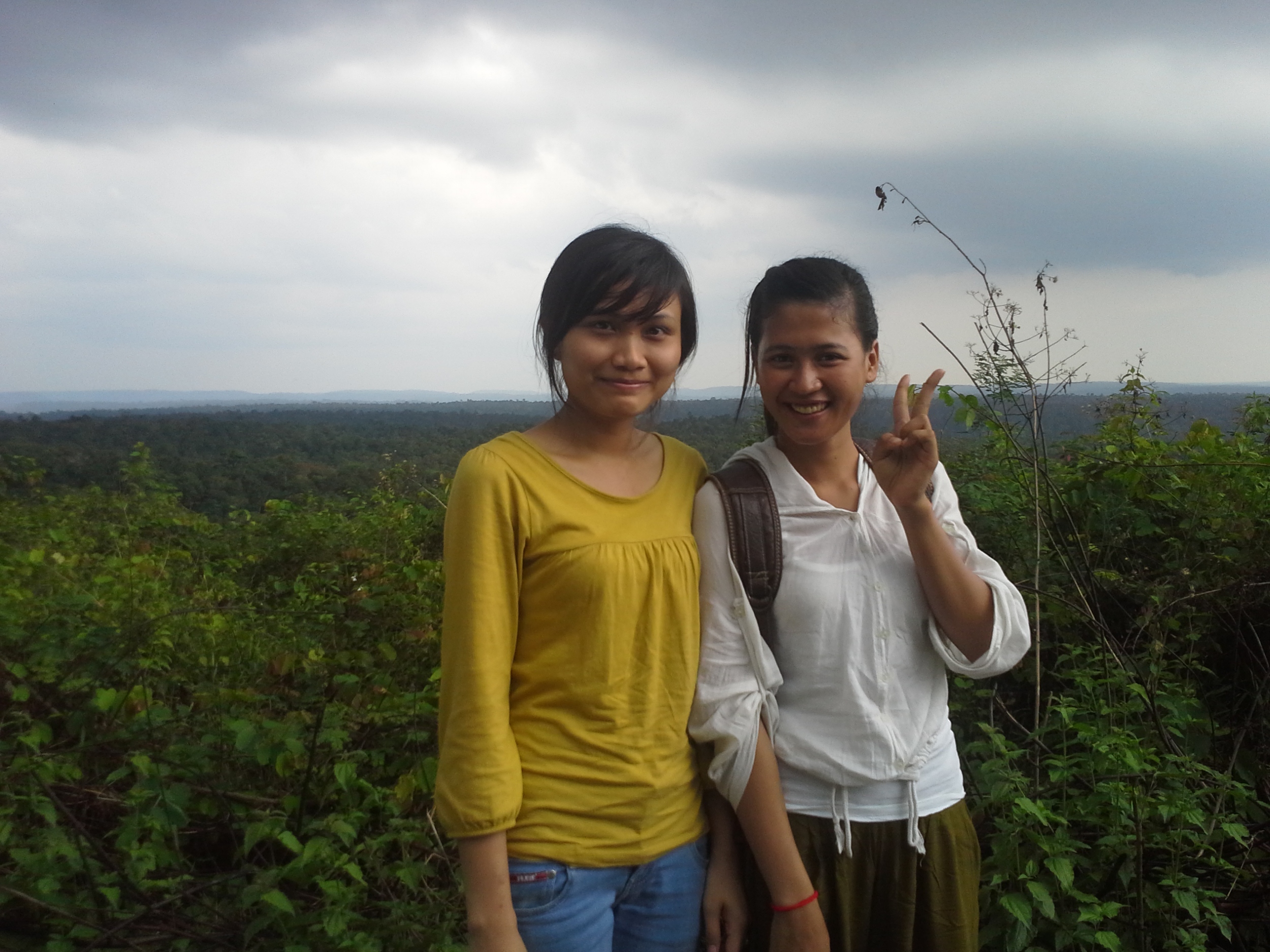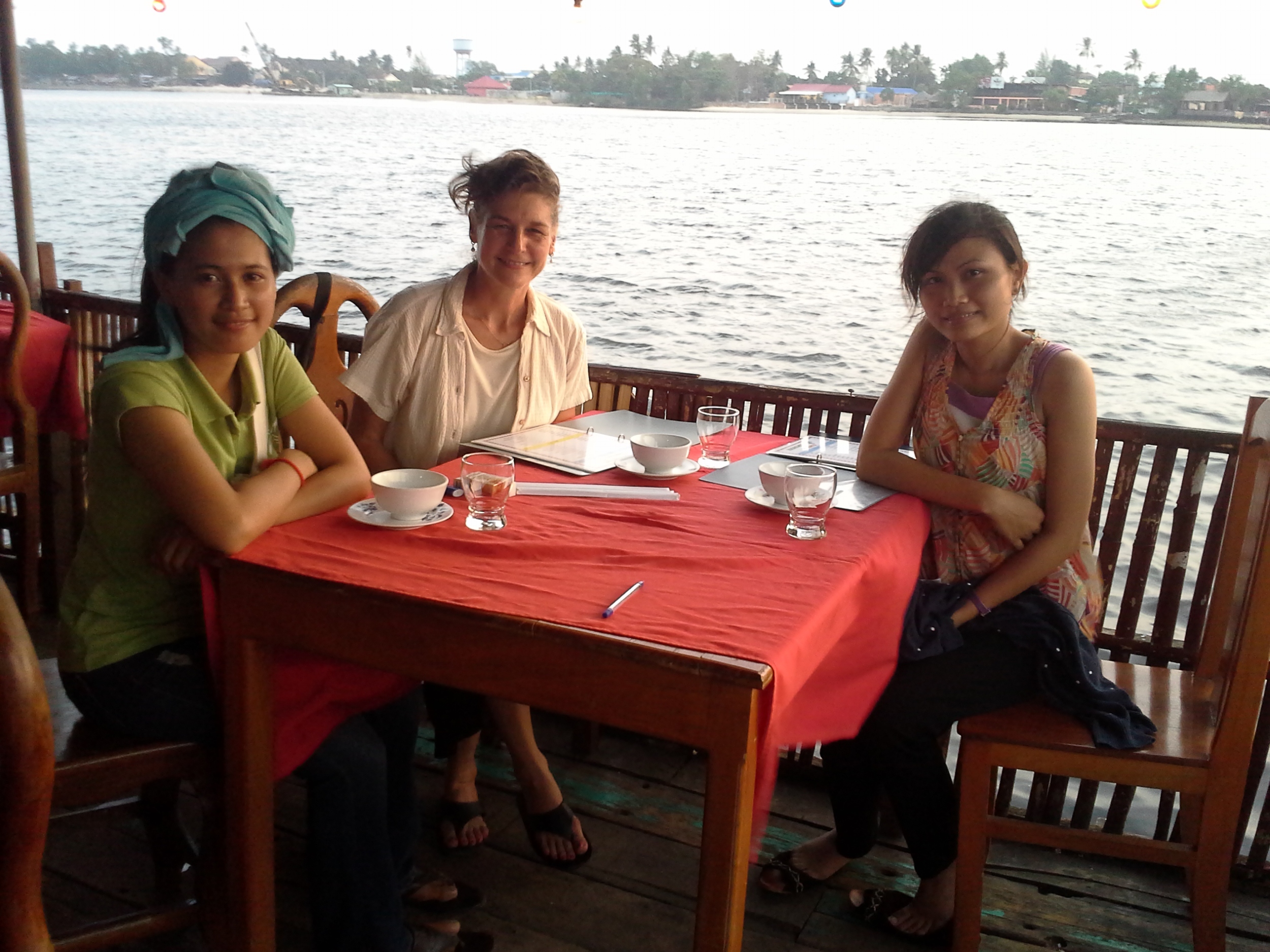Prak Sinan lives in a small village in Kampot, just over the seaside province of Kep. A dramatic rocky mountain formation towers over her back yard, and her front yard is a roadside store never short of customers or passing visitors. It is interesting to see the social life of rural villagers, who gather to play cards or gossip and catch up on the news while enjoying a cold drink. Knowing this is her family's primary source of income, we appreciated that Prak Sinan closed the store for our interview so she could be undisturbed. At one point when a nephew came to nap in the interview room, Prak Sinan politely asked that he leave for privacy, and he did so very willingly. As a former teacher, Prak Sinan is very knowledgeable about the history of Cambodia before and after the Khmer Rouge regime, and she makes it a point to share her stories of the genocide with younger people who often "do not believe that Khmer killed Khmer." She also makes important links in her story between the instability of Cambodia's past to the challenges facing Cambodia today in terms of land rights and labor strikes.
March 15, 2013, Koh Kong Interview
Koh Kong province is on the Thai border about five hours west of Phnom Penh. This was the farthest we had traveled outside of Phnom Penh for an interview, and it also was the most remote setting we had yet visited--logistics entailed a long windy bus ride through the mountains to Koh Kong city, securing a guest house that did not allow prostitution for the sex tourist that flock to the city over the Thai border, and a reliable and safe driver for the 50-plus kilometers to Leang Korn's home at the foothills of the mountain range.
Leang Korn lives just outside of TaTai, a conservation area full of waterfalls, trees, and wildlife that attracts Khmer and international tourists. She lives with her two grandchildren and a family of friendly dogs, running a home stay for nature tourists and supplementing her income by baking cakes for sale in the nearby market. During the interview, Leang Korn's grandchildren quietly studied and prepared their lunch under the house; later in the afternoon, they attended school. This was the first interview where Thorn Sina joined the research team along with Sotheary and Theresa. Leang Korn is often approached by other researchers and film-makers, and she needed few questions to get her talking about her story. At the same time, because she has not always been happy with the way researchers have approached her, we needed to gain her trust and stress that she is the one in full control of her story and how it is used and shared. We spent the whole day together Koh Kong and then met in Phnom Penh a few weeks later for another interview.
March 5, 2013: Kampong Cham Interview
Our research team for Nam Mon's interview was the largest yet, with two student volunteers helping to take English notes and Khmer transcription during the interview, and a volunteer photographer taking pictures. With a team of five people, we enjoyed the teamwork, but ultimately decided it was too many people for a comfortable interview. Nan Mon's lives in a village about 20 minutes from Kampong Cham city (about 3 hours out of Phnom Penh) in a traditional wooden raised house with slatted floors open to the ground below. Family, friends and neighborhood children came and went throughout the day under and into the house. You can hear their conversation, along with the sounds of chickens and passing motos and tuk tuks, on the interview tape. Nam Mon is certainly a central figure for much of the family's activities, with little time or privacy to herself. She raises her youngest children alongside her grandchildren while her daughters work in Phnom Penh, and supports herself as a farmer in a nearby rice paddy. Along with her husband, she is a civil party to the ECCC and therefore is knowledgeable about the proceedings of the court. Non Mon's petition to the court is on behalf of her family, all killed under the Khmer Rouge regime. Not included in her petition is her rape case at the age of 16, as sexual crimes are not being taken up by the ECCC.
January 26, 2013: Phnom Penh Interview
January 26, 2013: Phnom Penh
Our second interview was with Sok Samith, who lives in a single-story white house down a quiet lane nearby a busy pagoda close to the city center of Phnom Penh. We were greeted by her two dogs, Sasa and Kacy, and one cat, Lily. Sok Samith is unmarried and lives with a niece in her early 20s. Sok Samith's story reminds of how Khmer Rouge discriminated against "New People," those urban dwellers evacuated from the cities when the regime took power. Often from the educated classes, they knew little about farming or how to survive the jungle elements, and they were often subjected to harsh punishment for being suspected enemy spies.
Sok Samith spent her early childhood in rural Srey Rieng province. The area was often bombed by the U.S. as part of the neighboring Vietnam War across the nearby border. Many residents, including Sok Samith and her family, fled to Phnom Penh for safety, and the city was crowded with refugees when the Khmer Rouge took power on April 15, 1975, forcibly evacuating the city in three days time. Although Sok Samith and her family were native to rural Srey Rieng, they were treated as “New People” as they lived in Phnom Penh when the Khmer Rouge entered the city. Her fate is most likely shared by many refugees who had fled to the city to avoid the armed conflict on the border.
January 24, 2013: Takeo Interview
This was our first interview in the field, traveling about two hours by car out of Phnom Penh to Takeo to visit Kim Khem at her home in a rural area about 30 minutes from the provincial capital city. Taing Samrich joined Sotheary and me as part of the team. It did make a difference that a male was part of our team, and at one point Kim Khem deferred telling details of a part of her story concerning rape as "the nephew was here with us." Though not formally educated, Kim Khem was learned in the ways of Chbap Srey, or the Code of Womenhood, and she prepared for us with canned drinks from the market and dressed in her traditional Khmer silk skirt. We also noticed that Kim Khem had a unique and traditional way of expressing herself, often using sounds rather than words (onomonpia), and frequently repeating whole sentences for emphasis and rhythm. Kim Khem's story is so important, among other reasons, because it spans a very long time over her 80-plus year life. We are able to see how she was impacted by armed conflict and oppressive regimes from her earliest childhood until even today. We interviewed Kim Khem inside the house she shared with her daughter, and the family, animals, and neighbors were always close by and are captured on the audio as part of Kim Khem's everyday environment.





